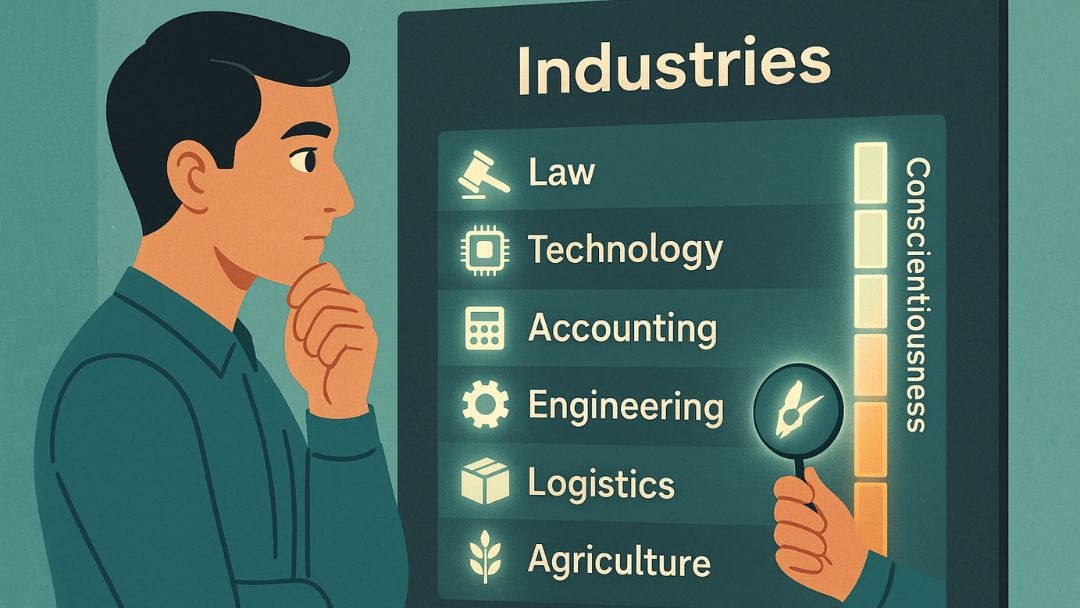Entrepreneurship Through the Lens of High Conscientiousness
High Conscientiousness is more than a personality score. It shapes how entrepreneurs set goals and follow through with daily effort. This piece explores what makes this trait so powerful in a business setting.


Back
7 mins read
Conscientiousness, one of the Big 5 Personality traits, involves having strong organizational skills, being dependable, hardworking, and striving for long-term goals. Those with high conscientiousness tend to be proactive planners, thorough in their work, and reliable when following through on tasks or commitments. Conversely, those with low scores often find themselves disorganized, careless, and unable to effectively manage time, resulting in incomplete tasks or forgotten obligations. Overall, in the context of entrepreneurship, this trait relates to self-control and discipline that ultimately allow individuals to meet business goals efficiently while upholding the standards of excellence.
Highly conscientious entrepreneurs tend to embody a goal-oriented style, setting clear, ambitious, and precise objectives. They're typically detail-driven and methodical, giving them an edge when planning effectively for business success. This level of focus can help ensure efficient execution along the way, ultimately leading them towards achieving their entrepreneurial ambitions.
You may also want to read:
- How Does Moderate Conscientiousness Impact Entrepreneurial Style?
- How Does Low Conscientiousness Entrepreneurial Style?
- Best Jobs and Careers for Conscientiousness Personality Traits
- Big 5 Conscientiousness vs. Lack of Direction: How Do These Traits Impact Learning Styles?
- Conscientiousness vs. Lack of Direction and Leadership Style: Strengths and Communication Styles
- Big 5 Conscientiousness vs. Lack of Direction Relationship Styles
How Does High Conscientiousness Score Impact Entrepreneurial Style?

As an entrepreneur, exhibiting a high level of conscientiousness typically leads to meticulous planning and execution of your business strategy. This approach promotes proactivity in problem-solving and decision-making, both essential entrepreneurial skills. Also, this trait is often associated with a strong work ethic and a sense of duty toward one's endeavors.
Plus, high conscientiousness, as well as high extraversion, high openness, low agreeableness, and low neuroticism, are traits directly associated with success in business and entrepreneurial intentions.
High conscientiousness can majorly affect team dynamics and worker relationships in entrepreneurial ventures. People who score high for it are often seen as trustworthy by colleagues and subordinates because they consistently fulfill their duties and responsibilities. Moreover, these entrepreneurs usually set clear expectations with distinct roles and responsibilities, leading to improved productivity and efficiency.
Tips for Achieving Success with High Conscientiousness as an Entrepreneur

To make full use of high conscientiousness to reach success, you must put strategies into practice that match your entrepreneurial style. Here are some suggestions on how to succeed while possessing great conscientiousness:
Leverage Your Organizational Skills:
Your gift to the organization can be an invaluable asset. Maximize its potential by structuring your day, setting objectives, and mapping out a plan to reach them. This approach will keep you on course and facilitate effective personnel and operations management within your business environment.
Focus on Quality:
Your eye for detail and precision will be your strongest ally in ensuring the quality of all that you produce. Constantly strive to keep standards high to provide the best products and services to your customers.
Utilize Time Management Techniques:
As a person with high conscientiousness, you are great at time management. You can become even better by using tools and techniques that work for you, whether it's a digital calendar, a to-do list, or a time-blocking technique.
Maintain Integrity:
Your conscientiousness speaks volumes about your moral code. In all your dealings, remain true to yourself and stay principled. Honesty and integrity are invaluable traits that will help you build trust with others, which is essential no matter what business you are in.
Delegate Effectively:
Effective delegation is key for managing your workload and helping you prioritize important tasks. By leveraging your organizational skills, you can confidently delegate duties and trust that the team will fulfill their obligations.
Harnessing your high conscientiousness is the key to entrepreneurial success. Remember, it's a valuable asset that should be managed effectively for you to reap its rewards. Follow these tips and strategies to leverage this trait to achieve long-term business objectives.
Cons of Having High Conscientiousness as an Entrepreneur

Being highly conscientious can be advantageous in many ways, but it also has downsides. Let’s take a look at some of the most obvious ones:
Risk of Burnout:
Those with high conscientiousness scores tend to be highly devoted and committed. Frequently, they find it difficult to step away from the task at hand, which may result in them working too much. This laser-like focus on achievement can, unfortunately, culminate in burnout. However, they still cope with stress better than low-conscientious entrepreneurs.
Perfectionism:
Conscientious people are renowned for their thirst for perfection. They consistently set the bar extremely high in terms of personal and professional standards, a trait that can bring about exemplary outcomes but also cause unnecessary stress.
Inflexibility:
Having a preference for detailed plans and structures can make one inflexible. This lack of adaptability may impede an entrepreneur's capacity to respond quickly to new information or changing situations, ultimately preventing them from making the most effective decisions fast enough.
Micromanagement:
The urge for control and pursuing perfection can sometimes lead to micromanagement. This phenomenon is not only time-consuming but also demoralizing for employees and makes the workplace atmosphere tense.
Self-Criticism:
Extremely conscientious people tend to be quite hard on themselves. While this can lead them to make positive changes, it may also cause them to become overly critical of their thoughts and actions, resulting in lower self-esteem.
Entrepreneurs with high conscientiousness should recognize and mitigate the potential cons of this personality trait. Remember, no one is perfect, and you shouldn't constantly be comparing yourself to more successful entrepreneurs. Focus on becoming a better version of yourself, which will pay off in the long run.
Famous Entrepreneurs with High Conscientiousness
![]()
Conscientiousness is a trait that can truly take entrepreneurs far. Highly productive and successful, many famous business owners are known for their commitment to meticulous attention to detail. So here are some of the most famous entrepreneurs who possess this trait:
Tim Cook:
Under the visionary leadership of CEO Tim Cook, Apple Inc. has seen a remarkable transformation in its operational excellence and customer satisfaction levels. His commitment to detail-oriented operations is evidenced by the success of their supply chain optimization initiative, widely recognized as one of the most efficient in existence today.
Frank Cary:
The former CEO of IBM, Frank Carry, earned widespread admiration for his commitment to hearing out every grievance voiced against the company or a supervisor during his "open door" meetings. This approach allowed him to address employees' worries and created an atmosphere of transparency and responsibility within the business.
Mark Zuckerberg:
Mark Zuckerberg, the mastermind behind Facebook and its CEO, is a shining example of an entrepreneur with supreme conscientiousness and a high IQ. His reputation for hard work and his dedication to self-improvement have proven fruitful, enabling him to build one of today's most successful tech firms.
Ingvar Kamprad:
Ingvar Kamprad, the founder of IKEA, was renowned for his dedication to offering economical furniture for everyone. His conscientious approach towards business, which included emphasizing sustainability and productivity, proved instrumental in establishing IKEA as a leading global furnishings retailer.
Ray Kroc:
Ray Kroc is renowned for his commitment to giving customers the same outstanding quality every time. His meticulous approach towards business, encompassing standardization and rigorous checks on excellence, enabled McDonald's to become the world's leading fast-food empire.
Paul Polman:
Paul Polman, the ex-CEO of Unilever, has become renowned for his dedication to sustainability and corporate responsibility. His conscientiousness served as a catalyst in transforming Unilever into an industry leader in sustainable business operations across the globe.
Jamie Dimon:
Jamie Dimon, the Chairman and CEO of JPMorgan Chase, has been widely lauded for his conscientiousness in managing the business. He is renowned for emphasizing risk management as well as customer satisfaction and corporate responsibility, all of which have contributed to the flourishing success of JPMorgan Chase over time.
Conscientiousness is an invaluable trait for entrepreneurs, enabling them to strive towards and accomplish ambitious objectives while upholding a strong work ethic. It motivates those hoping to make their mark on the world by using a structured and focused approach to business.
High Conscientiousness Businesses and Industries

If you've scored high on conscientiousness in a Big Five personality test, there's no doubt that certain businesses and industries would be ideal for your entrepreneurial pursuits. Here are some top-notch options to give you an idea of the types of ventures to consider.
Legal Services:
The legal profession demands the utmost precision and attention to detail. Hence, entrepreneurs in this sector need to be highly conscientious. To offer the best service to their clients, they must stay organized and diligent and pay attention to various legal details and nuances.
Technology and Software Development:
The tech industry is a highly dynamic field where entrepreneurs must keep up with rapid change. To succeed in such an environment, it's essential to have strong conscientiousness. This means staying organized, planning ahead, and being determined to focus on your goals.
Accounting and Auditing:
Entrepreneurs with an eye for detail, the capacity to manage considerable amounts of data, and a robust commitment to accuracy and integrity are well-suited for providing superior accounting and auditing services. These traits come naturally to conscientious business owners, making them ideal candidates for such roles.
Engineering Services:
Engineering services demand meticulous planning, a sharp eye for detail, and an unwavering commitment to delivering superior solutions. Entrepreneurs with a conscientious nature are often well-suited for engineering roles as they have the skill set needed in this industry.
Logistics and Supply Chain:
Successful entrepreneurs in the logistics and supply chain operations space need to demonstrate a high level of conscientiousness. This industry requires strong organizational skills, careful planning, and efficient delivery of reliable results.
Pharmaceuticals:
Success in this field calls for rigorous adherence to standards and protocols, paying scrupulous attention to detail, and a great sense of duty given the likely consequences on public health. Highly conscientious entrepreneurs will undoubtedly excel here as these traits come naturally.
Agriculture:
Running an agricultural enterprise necessitates meticulous planning, organization, and dedication to sustainable practices. Owing to their instinctive capacity for strategizing, structure, and a deep sense of accountability, conscientious entrepreneurs often thrive in this sector.

Conscientiousness is a highly desirable quality in any industry. It is the most consistent personality predictor of job performance across all types of work. Aspiring entrepreneurs should carefully consider which sector suits their interests and capabilities best. The best way to become successful is to do what you like and like what you do.


Return to Blog






